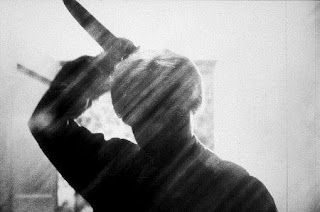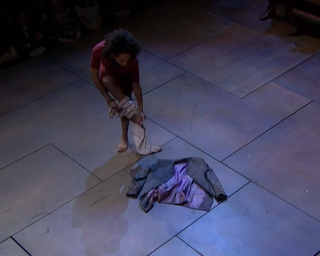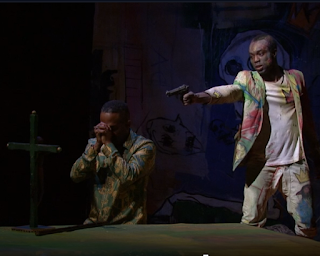Act III, scene iv: A rash and bloody deed
Now we reach the point of no return for Hamlet - the pivot on which the rest of the play turns. And there is plenty of drama. Having toyed with the idea of murder in the previous scene, his is driven to murderous action in this one - before his father's ghost reappears.
The scene opens with Polonius' antagonistic imperatives to the Queen - about how to speak to her son, in order to 'lay home' aspects of his behaviour and 'tell him' that it will no longer be tolerated (III.iv.1-2) - before Polonius secretes himself behind the arras.
But a suggestion that Gertrude has mediated on Hamlet's behalf hovers on the air, that she 'hath screen'd and stood between/Much heat and him' (III.iv.3-4).
Hamlet, though, is evidently unaware of any such intercession. When he arrives, the dialogue with his mother provides what is possibly my favourite exchange of the play.
Queen Hamlet, thou has thy father much offended.
Hamlet Mother, you have my father much offended.
Queen Come, come, you answer with an idle tongue.
Hamlet Go, go, you question with a wicked tongue.
It is a vicious pair of provocative parallels - Hamlet twisting his mother's words with the aplomb of the angriest of young men, and shunning her intimate 'thou' for the more impersonal 'you'. This single line back-and-forth sparring dialogue has a technical term, 'stichomythia' and is traditionally used to show characters in conflict or to elevate the emotional intensity of an exchange.
You can listen to another useful Conor Hanratty podcast on this moment of Hamlet's 'rash and bloody deed' (III.iv.27), but in response Hamlet offers another biting couplet: 'A bloody deed. Almost as bad, good mother,/As kill a king and marry with his brother' (III.iv.28-29), confirming Hamlet's suspicion that the Queen is also guilty of murder. Hamlet doesn't pursue this line of attack further, instead choosing to return his focus to his disgust at Gertrude's relationship with Claudius.
The Ghost reappears - significantly only to Hamlet - and reminds him of his oath. Then follows a strange, final exchange between Hamlet and his mother. Hanratty's Episode 113: I Must Be Cruel to Be Kind explores this is some detail.
It's probably time to start making up your mind about Gertrude, now - though Shakespeare has created a great deal of ambiguity surrounding her. Like Ophelia in the previous act, she has allowed herself to be spied upon to entrap Hamlet, and arguably in a position of greater power and status to be able to refuse. But, she also seems astonished by Hamlet's accusation. 'What have I done that though dar'st wag thy tongue/In noise so rude against me?' (III.iv.39-40). Perhaps this is the first time she has considered that the old King was murdered.
And finally, this post's image has nothing (much) to do with Hamlet. Anyone recognise it?
Thus Hamlet's 'hot blood' from earlier in the Act is brought back to boiling point, and when he hears a sound behind the arras he murders Polonius (unseen) through the cloth - suspecting the presence of Claudius. 'Is it the king?' (III.iv.26)
You can listen to another useful Conor Hanratty podcast on this moment of Hamlet's 'rash and bloody deed' (III.iv.27), but in response Hamlet offers another biting couplet: 'A bloody deed. Almost as bad, good mother,/As kill a king and marry with his brother' (III.iv.28-29), confirming Hamlet's suspicion that the Queen is also guilty of murder. Hamlet doesn't pursue this line of attack further, instead choosing to return his focus to his disgust at Gertrude's relationship with Claudius.
The Ghost reappears - significantly only to Hamlet - and reminds him of his oath. Then follows a strange, final exchange between Hamlet and his mother. Hanratty's Episode 113: I Must Be Cruel to Be Kind explores this is some detail.
It's probably time to start making up your mind about Gertrude, now - though Shakespeare has created a great deal of ambiguity surrounding her. Like Ophelia in the previous act, she has allowed herself to be spied upon to entrap Hamlet, and arguably in a position of greater power and status to be able to refuse. But, she also seems astonished by Hamlet's accusation. 'What have I done that though dar'st wag thy tongue/In noise so rude against me?' (III.iv.39-40). Perhaps this is the first time she has considered that the old King was murdered.
- Freewrite about Gertrude. How culpable is she? What evidence is there against her? Look back at what she has said and done in Acts II and III. Is she on Hamlet's 'side' by the end of the scene?
- There are plenty more images of infection after Polonius' murder and before the return of the Ghost. Enjoy adding to your collection of quotations.
- Why, dramatically, does the ghost appear now?
And finally, this post's image has nothing (much) to do with Hamlet. Anyone recognise it?




Is the image the shower scene from psycho? :-)
ReplyDeleteWell spotted!
DeleteToo slow! (But there's another film reference for Act IV, scene ii...)
ReplyDelete